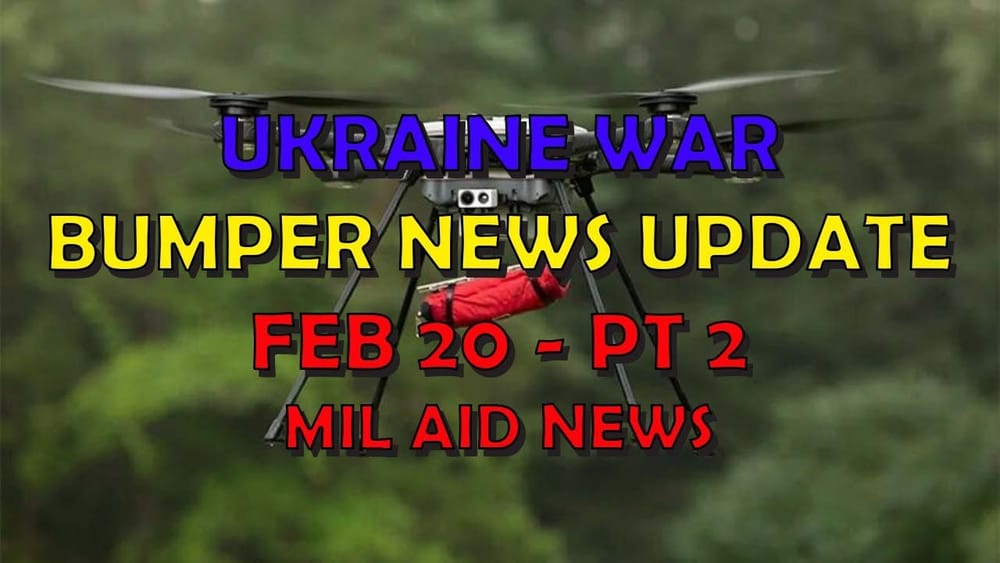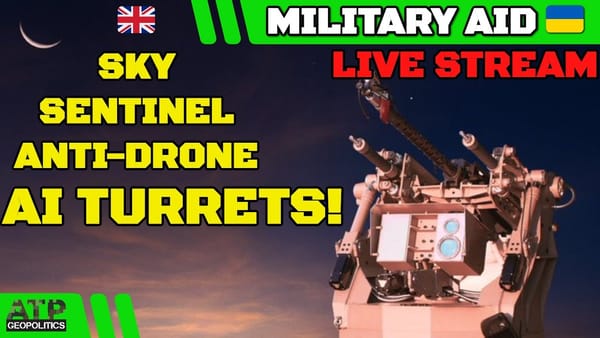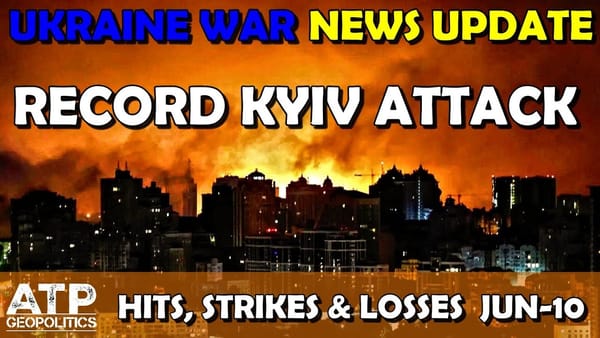Ukraine War Update NEWS: Military Aid
Table of Contents 📖
"Drones seem to be such an important part of this war that, although Ukraine has already upped their drone manufacturing capacity, they need as much help as they can get in those sectors too to keep the drone advantage going in certain sectors."
Hello Team
🎦 00:00-00:18⏩
Jonathan welcomes everyone to the second part of his Ukraine War Update, apologising that the first had to be posted to his other channel as YouTube didn’t like something in it.
Return to top⤴️
Ukrainian Soldier's Message
🎦 00:18-01:23⏩
Jonathan highlights a message from a Ukrainian soldier called Skidney, who until 2021 was a partisan in the Russian-occupied town of Kadyivka. The soldier's message emphasises that Ukraine only needs artillery shells and aircraft, as they are increasingly capable of producing other equipment domestically. Jonathan agrees with the sentiment, noting that while Ukraine is bolstering its own production capabilities for items like drones, armoured personnel carriers, and howitzers, they still require external assistance for specific items, particularly airframes and ammunition. This aid from partners remains crucial.
Return to top⤴️
Sweden Military Aid Package
🎦 01:23-04:14⏩
Sweden has announced a new military aid package for Ukraine, the largest to date, worth almost $700 million. Swedish Defence Minister, Pal Jonson, stated that this brings the total value of Sweden’s military assistance to Ukraine to $2.9 billion. The package will include:
- Artillery ammunition
- RBS-70 air defence systems
- Anti-tank missiles
- Hand grenades
- Karl Gustav grenade launchers
- Medical supplies
- 10 CB90 combat boats and underwater weapons.
Sweden will also provide economic aid to help Ukraine procure more weapons, particularly artillery ammunition. In addition to the aid package, Sweden and Denmark have agreed to jointly invest $385 million in the procurement of more CB90s. The Swedish Defence Minister emphasised that this support is crucial for both Ukrainian and Swedish security. Jonathan points out that this level of support is impressive considering the size of Sweden and questions how many artillery shells are included. He notes that the procurement of further shells is essential, as it is what Ukraine needs the most at the moment.
Return to top⤴️
Canada Military Aid Package
🎦 04:14-05:08⏩
Canada will send more than 800 Sky Ranger R17 multi-mission unmanned aerial systems to Ukraine to support its defence against Russia. The Canadian Ministry of Defence announced the aid package, worth $70.4 million, on 19 February 2024, as part of the $500 million Canadian dollar military assistance pledged by Justin Trudeau during his visit to Kyiv last year.
Return to top⤴️
Netherlands Military Aid (Drones)
🎦 05:08-05:23⏩
The Dutch Defence Minister has declared that the Netherlands is already sending drones to Ukraine following the announcement on 14 February 2024 that it would participate in a Latvian-led coalition to provide Ukraine with advanced military drone technology. Jonathan believes this is fantastic news, as drones are a vital aspect of this war, and Ukraine needs all the support it can get to maintain its drone advantage, even though they have increased their drone manufacturing capacity.
Return to top⤴️
EU Ammunition Procurement
🎦 05:33-09:53⏩
Josep Borrell, the EU’s High Representative for Foreign Affairs and Security Policy, has urged EU member states to purchase ammunition for Ukraine from outside the bloc if the supply source is superior, faster, and more cost-effective. He stated that funding is available for procuring ammunition beyond Europe, not just from the European defence industry. Jonathan is unsure whether a veto still exists on the EU using its funds to purchase artillery ammunition from outside the bloc. He speculates that the EU might reimburse member states for such acquisitions. Jonathan recalls reporting that France, Greece, and Cyprus had vetoed the EU's procurement of ammunition from outside the bloc using central funds. He had speculated that this was driven by a desire to keep EU money and jobs within the bloc, especially in the case of France. While this reasoning holds economic weight, it doesn’t address Ukraine’s urgent need for supplies. Jonathan also notes that Greece, Cyprus, and France blocked funding for Bayraktar drones and Turkish-made artillery shells to Ukraine, suspecting it might stem from Greece and Cyprus's long-running dispute with Turkey. He clarifies that the veto was specifically against EU funds being used to purchase ammunition from Turkey, effectively preventing Greek and Cypriot contributions from going to Turkey. He's pleased to have understood this situation better, citing a report by the Greek edition of Kathimerini, which stated that the drones and shells were to be purchased using European funds. He infers that, following Josep Borrell’s statement, nations can now make individual purchases, signalling positive developments ahead. In other news, Ukrainian Defence Minister, Rustem Umerov, has expressed gratitude to the Czech Republic for their ongoing comprehensive military aid, which includes the training of Ukrainian pilots and participation in the demining coalition. Umerov stressed the importance of boosting supplies of artillery ammunition. Jonathan highlights that this is crucial because the Czech Republic had previously announced their ability to access hundreds of thousands of artillery shells. He interprets Umerov's gratitude towards the Czech Republic's proactive stance in providing ammunition as a sign of a behind-closed-doors agreement, potentially involving the acquisition of artillery ammunition, likely from Turkey. In US news, President Joe Biden is ready to meet with House Speaker Mike Johnson to discuss a $95 billion aid package for Ukraine, Israel, and Taiwan. Jonathan notes that the situation regarding the aid bill in Congress is becoming critical, highlighting that Mike Johnson's decision to go on recess for two weeks and not table the bill does not reflect the majority view of House Republicans. He points out that if all Democrats vote in favour of the bill, alongside a proportion of House Republicans, there will be sufficient support to pass it, especially given the Republicans' slim majority. This majority is steadily diminishing as they lose special elections, leading to Republican lawmakers being replaced by Democrats. Jonathan believes that bipartisan support for the aid bill in the House of Representatives is evident and that this is what concerns Mike Johnson. If the bill is put to a vote, it is likely to pass, potentially leading to backlash from figures like Marjorie Taylor Greene and Donald Trump. Jonathan then raises concerns over Mike Johnson’s campaign being funded by pro-Russian figures, citing a recent Newsweek article. In 2018, a group of Russians, including Konstantin Nikolaev, a known ally of Vladimir Putin, allegedly donated to Johnson's successful campaign for a Louisiana seat through the Texas-based American Ethane Company. Although a spokesperson for Johnson had previously assured the public that the money was returned after becoming aware of the situation, Jonathan is sceptical about this explanation. Several social media users have connected this donation to Johnson's opposition to the foreign aid bill, which would allocate $60 billion to Ukraine. On 14 February 2024, Johnson declared that he would not bring the bill, which had recently been passed by the Senate, back to the House for a vote and that the Republican-led House would not be pressured into passing it. Ukraine-based blog, Fakeoff, tweeted, "US Speaker of the House Mike Johnson received campaign contributions from American Ethane company 88% owned by three Russians. Now, do you understand why he’s categorically against aid to Ukraine?”. While the money was seemingly returned to American Ethane, Jonathan believes that this connection to a close ally of Putin raises serious doubts about Johnson's motivations regarding the aid bill. He highlights the importance of Biden meeting with Johnson to pass the aid bill as a matter of urgency, emphasizing its potential to save lives.
Return to top⤴️
Ukraine, SpaceX and Starlink
🎦 14:05-16:04⏩
Ukrainian media outlet, Suspilne, reports that Ukraine is collaborating with SpaceX to prevent Russia from using Starlink on the front lines. Jonathan questions whether this collaboration is specifically with SpaceX rather than Elon Musk, given Musk’s public stance on the Russia-Ukraine War. During an interview with Suspilne on 19 February 2024, Mykhailo Fedorov, Ukraine’s Vice Prime Minister and Minister of Digital Transformation, disclosed that Ukraine is working with SpaceX to find a solution to disable Russia’s use of Starlink satellite internet terminals in the temporarily occupied territories of Ukraine. Jonathan speculates that this is more likely a collaboration with the US Department of Defense (DOD) than with Musk himself. He explains that the DOD had previously signed a substantial contract with SpaceX to limit the influence of individuals like Elon Musk in military decisions related to Starlink. This decision was made to ensure the US government had greater control over these matters, particularly after Musk’s involvement in geofencing raised concerns. Jonathan highlights that a portion of SpaceX now operates as a separate military entity, primarily handling defence contracts, and he believes that Ukraine is likely collaborating with this branch of SpaceX, rather than directly with Musk. He concludes that this arrangement makes sense, given the potential conflicts of interest and the sensitive nature of military operations in Ukraine.
Return to top⤴️
Germany: Taurus Missiles Debate
🎦 16:04-19:57⏩
In Germany, the coalition government, composed of the Social Democratic Party (SPD), Greens, and Free Democratic Party (FDP) are pushing for more arms deliveries to Ukraine, increasing pressure on Chancellor Olaf Scholz. While avoiding explicit mention of Taurus cruise missiles, the draft motion advocates for delivering the necessary long-range weapon systems to support Ukraine’s territorial integrity. Deputies from various factions in the Bundestag are planning to vote on supplying Ukraine with long-range weapons this week, a decision seemingly triggered by Alexei Navalny’s death in Russia. Jonathan questions what actions the rest of the world will take in response to the death of Navalny, describing it as the apparent murder of an opposition politician in a country geographically within Europe. He acknowledges previous comments about the minimal differences between Taurus, Storm Shadow, and SCALP missiles, primarily in range. However, a commenter pointed out that Taurus missiles are better at bunker-busting. According to missile expert, Fabian Hoffmann, Storm Shadow and SCALP warheads employ a "multi-approach fuse initiation system" that necessitates manually setting the delay between impact and detonation. This setup makes it challenging to target intricate structures like bridges accurately. In contrast, the Taurus missile, equipped with the MEPHISTO warhead and the "Programmable Intelligent Multi-Purpose Fuse" (PIMPF), excels in this area. PIMPF enables the warhead to analyse and penetrate multiple layers of material effectively, making it highly effective against fortified targets like the Kerch Bridge. Jonathan suspects that Scholz’s reluctance stems from concerns about escalation, as the Taurus would be ideal for targeting the Kerch Bridge. He then highlights other concerns raised in the article, such as the potential for the Taurus, which relies on a terrain-following radar system for navigation in GPS-denied environments, to fall into Russian hands. Germany's apprehension is linked to the need to program topographical mapping data into the missile's guidance systems, a step perceived as escalatory. The article also emphasises the missile's advanced technology designed to overcome Russian air defence systems like the Pantsir and S-400, making it a desirable asset for Russian forces. However, Jonathan argues that similar concerns apply to all advanced weaponry supplied to Ukraine.
Return to top⤴️
Bulgaria: APC Delivery Delay
🎦 19:57-20:14⏩
Bulgaria has postponed the delivery of 100 armoured personnel carriers to the Ukrainian army, with the defence ministry requesting that NATO cover the transport costs. The 100 older BTR-60s promised by Bulgaria are therefore still awaiting delivery.
Return to top⤴️
Japan: $12.1 Billion Aid Package
🎦 20:14-21:26⏩
Japan will provide Ukraine with $12.1 billion in aid. This includes the previously announced and implemented volume of aid, including the $4.7 billion grant to be received by the end of February. Several agreements were signed between Ukraine and Japan, including:
- An intergovernmental convention on the avoidance of double taxation
- Dozens of agreements on supporting the recovery of Ukraine with Japanese organizations such as JICA, JETRO, Export Credit Agency, NEXI and the Japan Bank for International Cooperation
- Grant agreements for the implementation of restoration programs
- Intergovernmental memoranda on cooperation in the areas of education and technology.
Jonathan suspects that Japanese companies and organisations will play a significant role in these initiatives.
Return to top⤴️
Ecuador: Russian Military Equipment & Banana Ban
🎦 21:26-22:57⏩
Hopes that Ukraine would receive much-needed Soviet-era military equipment from Ecuador have been dashed following Russian pressure. The initial plan, as highlighted by YouTuber, Joe Bloggs, involved the US providing Ecuador with newer equipment, including Black Hawk helicopters, in exchange for Ecuador sending its older, Russian-made equipment to Ukraine. However, Russia, a significant importer of bananas, threatened to ban imports of Ecuadorian bananas in retaliation. Ecuador has now confirmed it will not be sending any equipment to Ukraine. Ecuadorian Foreign Minister, Gabriela Sommerfeld, stated that this was a direct instruction from the President of Ecuador, based on a policy of not supplying military equipment to countries engaged in armed conflict. Jonathan believes that, while this might technically violate Ecuador's original agreement with Russia for the equipment, Russia has successfully pressured Ecuador to reverse its decision. He describes it as a significant blow to Ukraine.
Return to top⤴️
2S22 Bohdana Howitzers Update
🎦 22:57-23:26⏩
More and more 2S22 Bohdana 2.0s are being deployed to the Ukrainian battlefront. Ukraine, with the help of its partners, has substantially increased production of these 155mm self-propelled howitzers. Jonathan acknowledges the ongoing challenge of securing enough ammunition but celebrates the fact that Ukraine is now able to produce these howitzers in significant numbers and deploy them to the front lines.
Return to top⤴️
F-16 Training Update
🎦 23:26-24:34⏩
While Ukrainian pilots are already flying F-16s solo daily, their deployment to the front line is being delayed due to the need for more comprehensive training beyond wartime scenarios. Jonathan believes that this is not surprising and stresses the need for Ukrainian pilots to be as prepared as possible before being sent to the front line. While the cost of the aircraft is a factor, he argues that the expertise of the pilots is far more valuable, emphasizing that losing undertrained pilots results in a loss of years of expertise and training.
Return to top⤴️
Polish Border Blockades
🎦 24:35-25:52⏩
Polish farmers' blockades are continuing to cause delays in delivering weapons to Ukraine. Photos show trucks carrying military cargo, including ammunition for artillery units, stuck at the border. Jonathan is concerned that the situation is worsening and that the motives behind the blockades now extend beyond the grievances of Polish farmers and hauliers. He suspects Russian influence, as well as anti-EU and pro-Russian sentiments, are exacerbating the situation, hinting at a deeper geopolitical dimension to the issue, which he plans to address in his next video.
Return to top⤴️
Russian Cargo Drone Prototype
🎦 25:52-26:46⏩
Jonathan discusses a prototype Russian cargo drone with a reported range of 500 kilometers and a payload capacity of up to 300 kilograms. The drone is designed to operate autonomously, taking off, landing, and transporting cargo without operator intervention. While acknowledging its potential, commentator, ps01, expressed doubts about its practicality. Jonathan uses this as an opportunity to reiterate the growing significance of drones in warfare, emphasizing that all nations are investing heavily in drone research and development to create a wide range of drones with diverse capabilities. This, he argues, is driven by the need to reduce reliance on human soldiers and to carry out missions efficiently and effectively. Jonathan concludes by emphasizing that, along with artillery shells, drones have become a focal point in the current conflict.
Return to top⤴️
Wrap up
🎦 26:46-26:53⏩
Jonathan thanks viewers for watching, asks them to like, subscribe and share the video and expresses his appreciation for their ongoing support.
Return to top⤴️



